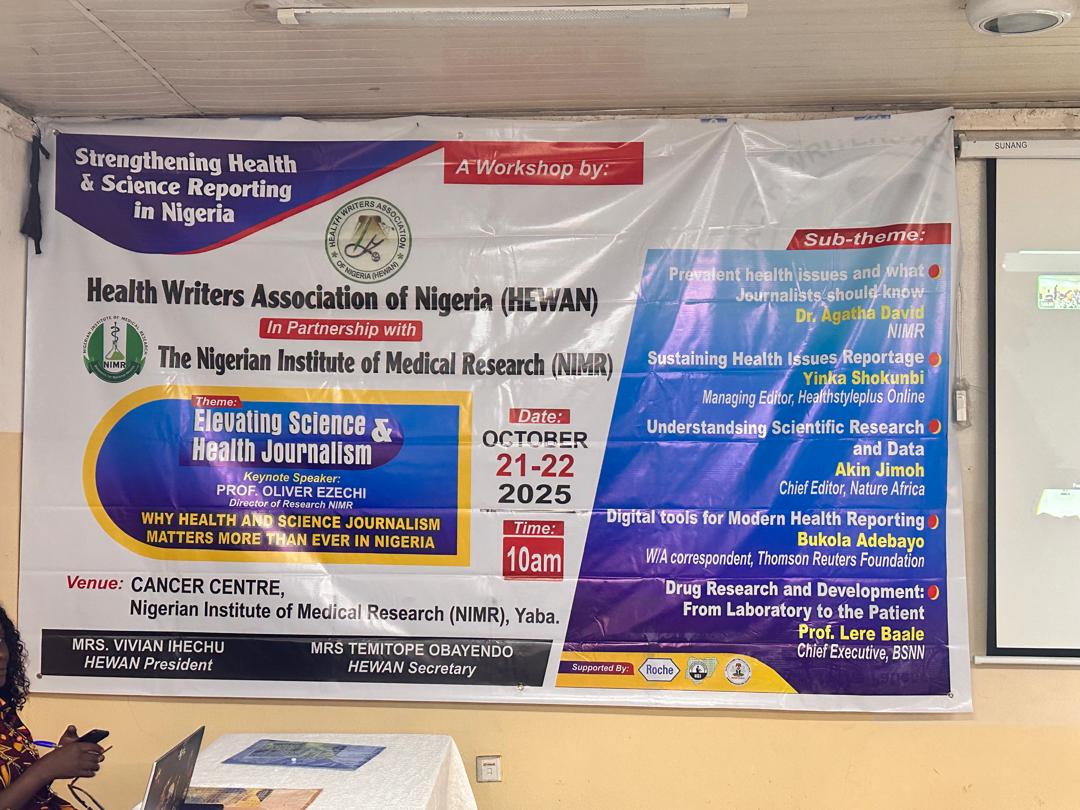*Says Nigeria faces challenges of diseases demanding surveillance BY MATTHEW UKACHUNWA Lagos The integrity, clarity and accountability of he
*Says Nigeria faces challenges of diseases demanding surveillance
BY MATTHEW UKACHUNWA Lagos
The integrity, clarity and accountability of health reporting has a direct and tangible bearing on public health outcomes, from individual health decisions to community-level interventions and national health strategies, the leader of a medical research body has emphasized.
Professor John Obafunwa, the Director-General of Nigerian Institute of Medical Research (NIMR), made the assertion at a two-day workshop on “Strengthening Health and Science Reporting in Nigeria.”
The workshop which was organized by Health Writers Association of Nigeria (HEWAN) in partnership with NIMR took place in Lagos from 21st to 22nd October 2025.
Obafunwa in his remark told participants that the gathering would present a shared commitment to elevate the quality, integrity, and public value of health journalism, describing the values as a commitment he has championed throughout his career and one he believes must guide collective efforts in the years ahead.
He said, “Today’s convergence comes at the watershed moment for health journalism in Nigeria.
“We live in an era of rapid scientific advancement, ecological innovation, and an ever-expanding body of health knowledge,
paired with persistent health challenges from infectious diseases that demand future surveillance, to the rising body of non-communicable conditions that require sustained lifestyle policy and clinical responses.”
“It is therefore essential that we, as a profession, as a community, commit to ensuring that Nigeria has future assets to trust worthy health and scientific insights, and inform personal choices, guide policy composition, and strengthen our health system for the long term.”
The Nigerian Institute of Medical Research leader stated that through enforcing trusts, reducing uncertainty where possible, and explaining complexities in accessible terms, “we can empower citizens and participate more fully in dissolving our faith, their lives, and my community.”
Obafunwa described the workshop as a kind of investment that pays dividends, as health information becomes more accessible,
accurate, and actionable for diverse Nigerian audiences.
“Leadership in health generally is not the sole responsibility of any single organization or individual.
It is a collaborative venture characterized by shared vision, mutual trust, and sustained cooperation.
“Our strength lies in enduring partnership across Nigerian houses,
diverse institutions, robust research institutions, health agencies, functional associations, and civil society organizations.”
He emphasized that the idea behind the event’s agenda will pursue strengthening of reporting quality, boosting data literacy, advancing ethics, and fostering cross-sector collaboration, embodying the spirit of collective action.
The NIMR chief added that “through embracing multidisciplinary collaboration, we can bridge the gap between everyday generation policy development and community health practices.”
“I will encourage you all to approach today’s session with openness, curiosity, and a willingness to challenge assumptions when necessary,” the professor instructed the participants, noting: “We are a professional tribe of rigorous debates, conducted with respect, humility, and a shared commitment to the public good.
“Let us depart from this function with a renewed resolve to pursue accuracy, clarity, and responsivity in every story we tell, with a clear plan for translating what we learn into a different outcome for our students.”
He expressed hope that the conversation at the workshop would seed lasting collaborations, elevate public understanding,
and strengthen the trust that communities brazenly inherit.




COMMENTS